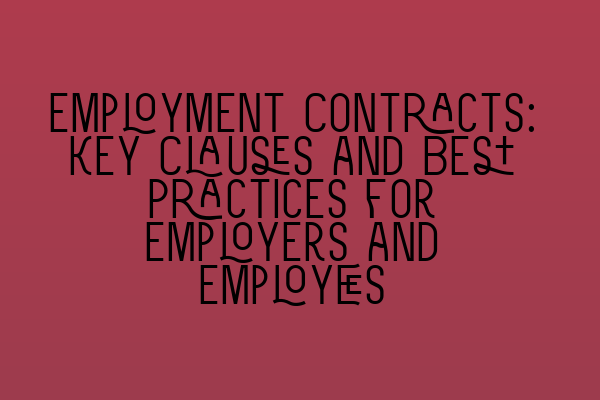Employment Contracts: Key Clauses and Best Practices for Employers and Employees
When it comes to employment agreements, both employers and employees need to understand the key clauses that should be included to ensure a mutually beneficial working relationship. A well-drafted employment contract sets clear expectations, protects the rights of both parties, and helps prevent disputes. In this article, we will explore the essential clauses that should be included in an employment contract, along with best practices for employers and employees.
1. Job Description and Duties
The job description and duties section outlines the responsibilities and tasks required of the employee. Employers should provide a detailed and accurate job description to avoid any misunderstandings regarding the role. Similarly, employees should review this section carefully to ensure they fully understand their job responsibilities and can meet the expectations set by the employer.
Related Article: SQE 1 Practice Exam Questions
2. Compensation and Benefits
The compensation and benefits clause specifies the employee’s salary, bonuses, commission, and any other financial incentives. It should also outline the benefits offered, such as healthcare coverage, retirement plans, paid vacation, and sick leave. Employers should clearly state the payment frequency and method to avoid any confusion, while employees should ensure they understand the full scope of their compensation and benefits package.
Related Article: SQE 1 Practice Mocks FLK1 FLK2
3. Working Hours and Overtime
The working hours and overtime clause defines the standard working hours and any flexibility in the schedule. It should also clarify the employer’s policy on overtime work, including the compensation rate for additional hours worked. Employers need to adhere to relevant labor laws regarding working hours and overtime, and employees must be aware of their rights and obligations for maintaining a work-life balance.
4. Termination and Notice Period
The termination and notice period clause establishes the rights and obligations of both parties in case of contract termination. It should specify the length of the notice period required to terminate the contract and outline the reasons for immediate dismissal, such as gross misconduct. Employers should ensure compliance with applicable employment laws and include provisions for severance pay, if applicable. Employees, on the other hand, should understand the notice requirements and their entitlements upon termination.
5. Confidentiality and Non-Disclosure
The confidentiality and non-disclosure clause safeguards sensitive information, trade secrets, and intellectual property of the employer. It prohibits employees from disclosing confidential information to third parties, both during and after their employment. Employers should clearly define what constitutes confidential information and outline the consequences of breaching this clause. Employees need to be aware of their obligations to maintain confidentiality in order to protect the employer’s proprietary information.
6. Intellectual Property Rights
The intellectual property rights clause addresses ownership and usage of intellectual property created by the employee during their employment. It clarifies whether the employer retains full ownership or if there are any shared rights. Employers should protect their interests by ensuring this clause is clearly defined and covers all potential scenarios, while employees should understand the implications for their work-related creations.
7. Dispute Resolution and Governing Law
The dispute resolution and governing law clause establishes the procedures and methods for resolving any disputes that may arise during the course of employment. It can include options for negotiation, mediation, or arbitration, depending on the preferences of both parties. Additionally, this clause should specify the jurisdiction and governing law that will apply in case legal action becomes necessary. Employers and employees should be aware of the dispute resolution procedures outlined in the contract to ensure a fair and efficient resolution of any conflicts.
Related Articles:
SQE 2 Preparation Courses |
SQE 1 Preparation Courses |
SRA SQE Exam Dates
Conclusion
Understanding the key clauses in an employment contract is crucial for both employers and employees. By incorporating these clauses and following best practices, employers can create a solid legal foundation for their relationships with employees, while employees can ensure their rights and obligations are clearly defined. Consulting with a solicitor who specializes in employment law can provide valuable guidance and ensure that your employment contracts meet all legal requirements and protect your interests.
